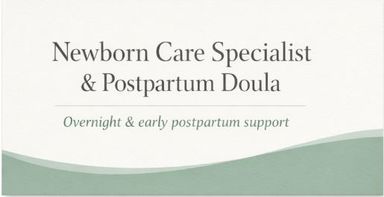Understanding the Difference
Postpartum Doula & Newborn Care Specialist
When bringing a new baby home, families are often overwhelmed by the range of professional support available. Many parents are unaware that Postpartum Doulas and Newborn Care Specialists (NCS) serve distinct roles, each designed to support different needs and timeframes during the postpartum period.
Understanding these differences helps families choose the right support for their situation.
Postpartum Doula
Postpartum doulas are especially helpful when parents want consistent, nurturing support centered on the new mother during the earliest days after birth.
Best for Families seeking emotional, physical, and basic household support immediately after birth.
Typical Duration: The first one to two weeks after delivery (sometimes extending up to four weeks).
Scope of Care:
- Mother-centered support focused on rest, recovery, nourishment, proper hydration, snacks, and emotional well-being.
- Support directly related to the birthing parent’s recovery and the baby’s immediate needs only.
- Support in ensuring the birthing parent is nourished, including assistance with recovery-focused meals prepared specifically for the mother, when applicable.
- Emotional support and education for the birthing parent.
- Guidance in newborn care, alongside support focused on the birthing person’s physical and emotional recovery.
- Support during early feeding and latching.
- Helping parents adjust to life with a newborn, with primary focus on the birthing parent’s recovery.
Note that the scope of care does not include general household management, cleaning, family laundry, or family meal preparation.
Newborn Care Specialist (NCS)
Newborn Care Specialists support new parents learn to recognize newborn cues, patterns, environmental needs, and developmental milestones, ensuring age-appropriate, attentive care.
Typical Duration:
From birth through the first six to eight weeks, with the option to extend based on family needs.
Primary Focus Areas:
- Exclusive focus on newborn care, including feeding, soothing, swaddling, diapering, and routine tracking
- Supporting healthy sleep patterns through observation and gentle routine development
- Overnight care that often takes place in the nursery, allowing immediate response to the baby rather than reliance solely on monitors
- Cleaning and sanitizing baby-related items, such as bottles and breast pump parts
- Washing and care of milk expression accessories
- Proper breast milk handling, including measuring, labeling, sorting, and storing
- Proper handling and preparation of formula, when applicable
- Baby-related laundry and organization only, directly connected to the newborn’s care
While an NCS may offer guidance to parents, the role is centered on the baby’s care and early development and does not include household management or postpartum recovery support for the birthing parent.
Day Shift vs. Night Shift Newborn Care
Daytime Support
- Interactive care during waking hours
- Sensory and motor development activities (tummy time, reading, infant massage, talking, non-medical observation)
- Parent education on newborn care, feeding, and soothing
- Baby-related tasks only
Nighttime Support
- Close monitoring of the baby’s safety and well-being
- Feeding support or bringing the baby to the parent for feedings
- Settling the baby back to sleep
- Immediate baby-related tasks only
Why Choosing the Right Role Matters
Some families benefit from both services — beginning with a Postpartum Doula for recovery support, followed by an NCS for specialized newborn care. Others may need only one role.
Understanding the distinction helps families choose the right professional for their needs.
